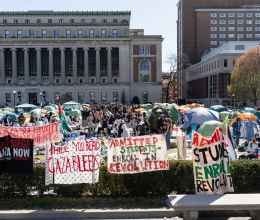
Fair Lawn High School student had been under investigation for Twitter posts criticizing Israel
NEWARK – A Fair Lawn High School student’s controversial Twitter posts did not constitute bullying, according to a determination by school investigators. A letter from the school’s principal notifying the family of the decision said an investigation found that the incident involved “peer conflict” but did not meet the standard for harassment, intimidation or bullying under New Jersey state law.
The ACLU of New Jersey, which represented 16-year-old Bethany Koval and her family, applauded the decision as a victory for free speech. However, the organization warned that Koval’s case exemplifies an overly broad application of New Jersey’s anti-bullying law, which requires a high standard that was not met here for activity to qualify as bullying.
The investigation was spurred by tweets Koval published during the school’s winter break that were sympathetic to Palestinians in the context of the Israeli-Palestinian conflict. Another student told the school administration that she felt threatened by the posts, prompting the charges of bullying. A media firestorm inflamed the situation and brought many to the defense of Koval, who also goes by Benny. The rush of support caused the hashtag #IStandwithBenny to trend on Twitter at one point. After her and her family’s ordeal, Koval has temporarily removed herself from Twitter.
“I am grateful for this ruling that posting my political opinions online was not considered bullying and for the fact that my speech didn’t deserve official censorship,” Bethany Koval said. “The manner in which the bullying law was used in my case was not in the spirit of free speech. It’s unfortunate that such a noble law in principle was used to justify something as troubling as chilling students’ speech.”
“I would be lying if I said this experience didn’t change me,” Bethany Koval added. “I have always believed that independent thought should be encouraged above all else, especially for impressionable students who are just discovering how to use their rights. If I hadn’t documented the incident online and garnered so much support, I might have been intimidated into silence. Through it all — in-person and online harassment, losing family and friends, a 90-person rally at the high school in support of the bullying charges, vandalization of our home, and the impact of everything on my outlook — my views have only grown stronger, and my voice, louder.”
On Jan. 6, Koval was called to the school’s main office, where Fair Lawn High School Assistant Principal Frank Guadagnino showed her a printout of her tweets, saying they could get her in trouble at school. Given the severe consequences that can accompany a finding of harassment, intimidation or bullying under New Jersey law, Koval asked for a lawyer before agreeing to sign any statements, a request that Koval said was not honored.
Koval criticized the Israeli government on Twitter, but Koval protected her classmates’ anonymity on her public social media accounts when they engaged her in discussions about the Israeli-Palestinian conflict. Koval posted on Twitter that students were talking “smack” about her because of anti-Israel Tweets. A school friend asked for their names on Twitter, but Bethany instead said she would message the student privately; Bethany’s schoolmate ultimately didn’t know the names. Toward the end of the Israel-focused Twitter conversation, Bethany said she was “sooooo glad that pro-Israel girl from my school unfollowed me!” and went on to criticize Israel with the remaining characters of the tweet, never naming any individuals.
Under New Jersey’s current anti-bullying law, passed in 2010 and updated in 2012, schools have an obligation to investigate any report of harassment, bullying or intimidation, letting individual principals determine whether those reports meet a certain threshold. If a student is found to have engaged in harassment, intimidation or bullying, the consequences can be severe, including suspension and expulsion.
“Bethany’s case shows how the anti-bullying law can be misused to stifle free expression, far from its intent to meaningfully address harassing behavior,” said ACLU-NJ Senior Staff Attorney Alexander Shalom, who helped the Koval family during the school’s investigation. “In some cases, the anti-bullying law is being read so broadly that perfectly constitutional free speech can easily be placed under a microscope, contrary to the spirit of the law. It’s not going to be the bland, inoffensive speech that tests the strength of the First Amendment; it’s going to be the words that spark controversy and inflame people’s passions. Students shouldn’t have to fear that their thoughts on politics, or anything else, could be taken out of context and have them branded as a bully, especially when the consequences can be so serious.”
According to New Jersey law, a student’s behavior rises to the level of harassment, bullying or intimidation if it is motivated by a real or perceived personal characteristic and substantially interferes with the operation of the school or the rights of other students. Additionally, the actions would have to be ones where a reasonable person would expect them to harm a student emotionally or physically, or they would have to insult or demean a student or group of students or create a hostile environment for a student. Schools receive grades for their anti-bullying efforts, which they must post on their websites. School employees can be held accountable for not investigating bullying.
“I cannot tell you how relieved my family is for this investigation to be over and for the school to have determined that Bethany’s speech wasn’t harassment, intimidation, or bullying,” said Debra Koval, Bethany’s mother. “I feel like my daughter’s rights have been vindicated now that she’s no longer under suspicion for being something that’s the opposite of who she is. I hope the school’s finding sends the message once and for all that expressing your opinions, even when they conflict with deeply held beliefs, is not something that deserves to be punished.”
“I am extremely grateful to Fair Lawn High School Principal James Marcella for his understanding and direction,” Debra Koval added. “I am extremely grateful as well to advocate David Stein for his steadfast support for Bethany’s free speech even while holding different views from hers, and to the ACLU-NJ for its help through this ordeal.”
In its annual reports, the New Jersey Anti-Bullying Task Force has identified the vagueness of the statute as problematic. Additionally, it has recommended allowing principals to first determine if the facts as presented would constitute bullying before proceeding with an investigation.



